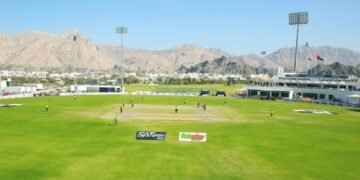Saudi Arabia is on the verge of making history by potentially securing the bid to host the 2034 FIFA World Cup. The country, with its ambitious Vision 2030 program, has been making significant strides in transforming its sports infrastructure, positioning itself as a major player in the global sporting arena. If awarded the World Cup, Saudi Arabia would become the first Middle Eastern nation to host the tournament since Qatar in 2022, further solidifying the region’s growing influence in international sports.
Saudi Arabia’s Vision for 2034
Saudi Arabia’s bid to host the 2034 World Cup is part of the kingdom’s broader plan to diversify its economy and enhance its global profile through sports. Under Crown Prince Mohammed bin Salman’s Vision 2030, the kingdom has been investing heavily in sports infrastructure, ranging from state-of-the-art stadiums to training facilities, and attracting top-tier sporting events to its shores. Hosting the World Cup would be a key milestone in this vision, bringing unparalleled international attention to the nation.
The Saudi Arabian Football Federation (SAFF) has been working diligently behind the scenes to ensure the country is fully prepared for such a monumental event. With a rich football culture and a growing domestic league, the nation is eager to showcase its passion for the sport on the world stage.
Infrastructure and Facilities Ready for a Global Event
Saudi Arabia’s infrastructure is rapidly evolving to meet the demands of global sporting events. The kingdom has already invested in world-class stadiums and facilities in preparation for events like the Saudi Pro League’s growing reputation, the Formula E races, and the Saudi International Golf Tournament. In addition, new stadiums are being built, and existing venues are being upgraded to meet international standards.
Cities like Riyadh, Jeddah, and Dammam are already home to major football clubs and have the necessary infrastructure to host global events. The country’s transport networks, including airports and highways, have also seen massive upgrades to ensure smooth transportation for the influx of visitors and teams.
Saudi Arabia’s commitment to sustainability is also evident, with a focus on making the World Cup a green event. The kingdom plans to integrate eco-friendly technologies into the construction of its venues and surrounding infrastructure, aiming for a long-lasting positive impact on both the environment and the local economy.
Growing Football Culture in Saudi Arabia
Football has long been a popular sport in Saudi Arabia, with the domestic league growing in stature over the years. The Saudi Pro League has attracted international talent, and the national team has made notable progress in international competitions. Recent victories, such as their historic win over Argentina at the 2022 FIFA World Cup, have sparked national pride and showcased the country’s potential on the global football stage.
Saudi Arabia’s investment in youth development programs and grassroots football initiatives is also paying off. The nation is nurturing young talent and providing them with the tools and resources to succeed at the highest levels of the sport. By hosting the World Cup, Saudi Arabia hopes to inspire the next generation of football stars and further elevate the country’s footballing credentials.
Regional and Global Support
The 2034 World Cup bid comes at a time when the Middle East is increasingly becoming a hub for international football. Qatar’s successful hosting of the 2022 World Cup marked a significant milestone for the region, and Saudi Arabia is eager to continue this legacy. The kingdom has strong support from regional partners and global football stakeholders, who see this bid as a way to further unite the Middle East through sport.
Additionally, Saudi Arabia’s diplomatic efforts, including strengthening ties with major footballing nations, have paved the way for the bid’s success. The kingdom has built strong relationships with FIFA and other global footballing bodies, which will likely play a crucial role in securing the 2034 World Cup.
What Hosting the 2034 World Cup Means for Saudi Arabia
If Saudi Arabia wins the bid to host the 2034 FIFA World Cup, the country stands to gain immensely on both the economic and social fronts. The event would bring substantial tourism revenue, with millions of visitors expected to attend matches, while also boosting local businesses and creating thousands of jobs. Additionally, the event would put Saudi Arabia on the map as a major sports destination, attracting future sporting events and investments.
Beyond the economic impact, hosting the World Cup would serve as a powerful symbol of Saudi Arabia’s commitment to cultural exchange and global cooperation. It would offer the kingdom an opportunity to showcase its rich heritage, hospitality, and modern advancements, helping to reshape global perceptions of the nation.
Future
Saudi Arabia’s bid to host the 2034 FIFA World Cup represents a bold step forward in its efforts to establish itself as a global leader in sports and entertainment. With its rapid infrastructural development, growing football culture, and unwavering commitment to Vision 2030, Saudi Arabia is well-positioned to host one of the world’s most prestigious sporting events. Should the kingdom be awarded the bid, it will mark a new era for football in the Middle East, while simultaneously bringing global attention and economic benefits to Saudi Arabia. The future of Saudi football looks bright, and the 2034 World Cup may be the crowning achievement of this transformative journey.
































